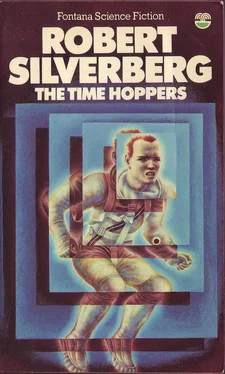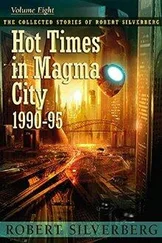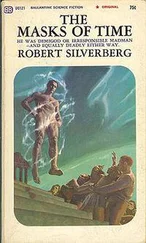There was really no need for Pomrath to have gone to the machine. Telephone lines linked every apartment with any computer to which there should be public access. He could phone to learn of his status; and in any event if there had been some upward twitch in his job profile, the machine would have been in contact with him by this time. He preferred to get out of the house, though. He knew the job machine’s answer in advance, so this was merely a ritual, one of the many sustaining rituals that enabled him to cope with the numbing fact that he was a wholly useless human being.
Subfloor scanners hummed as Pomrath stepped into the building. He was checked, monitored, and identified. If he had been on one of the registers of known anarchists, he would not have been permitted to cross the threshold. Clamps emerging from the marble floor would painlessly have secured his limbs until he could be disarmed and removed from the premises. Pomrath meant no harm to the job machine, however. He harboured hostilities, but they were directed against the universe in general. He was too intelligent a man to waste his wrath on computers.
The benevolent faces of Benjamin Danton and Peter Kloofman beamed down on him from the lofty reaches of the geodesic dome. Giant tridim simulacra dangled from the gleaming struts of the huge building. Danton managed to look severe even while he was smiling; Kloofman, who was reputed to be a man of great humanitarian warmth, was a more inviting figure. Pomrath remembered a time about twenty years ago when the public representatives of the High Government had constituted a triumvirate, with Kloofman and two others whose names he had begun to forget. Then one day Danton had appeared and the pictures of the other two were taken down. Doubtless one day Kloofman and Danton both would vanish, and there would be two—or three—or four new faces on the public buildings. Pomrath did not concern himself too deeply with changes in the personnel of the High Government. Like most people, he had some fundamental doubts about the existence of Kloofman and Danton. There was good reason to believe that the computers were running the whole show, and had been for at least a century now. Yet he did not fail to nod his head reverently to the tridims as he entered the job-machine building. For all he knew, Danton might actually be watching him out of the cold eyes of that big simulacrum.
The place was crowded. Pomrath walked to the centre of the marble floor, and stood for a moment enjoying the buzz and clamour of the machine. To his left was Bank Red, for job transfers. Pomrath had no dealings there; you needed to have a job before you could start negotiating for a transfer. Straight ahead of him was Bank Green, for members of the hard-core unemployed like himself. To his right was Bank Blue, where new members of the labour force filed applications for work. Each of the three banks had a long line in wait. Kids to the right; a bunch of eager-beaver Class Tens to the left, looking for advancement; straight ahead, the dismal legions of the jobless. Pomrath joined the line at Bank Green.
It moved swiftly. No one spoke to him. Wrapped in a cocoon of privacy in the midst of this crowd, Pomrath wondered, as he often did, where his life had been derailed. He had a high IQ, he knew. Good reflexes. Determination and ambition and flexibility. Why, he could have been Class Eight by now, if the breaks had gone his way.
They hadn’t. They never would. He had trained as a medical technician, thinking that illness was a constant even in a well-ordered world, and so there would always be a job for him. Unfortunately, many other young men of his generation had arrived at the same conclusion. As in the arthropod races, Pomrath thought. You picked your favourite lobster with care, judging his abilities and aggressiveness with all the shrewdness at your command. The factors were there to be assessed. The trouble was a lot of other men were just as shrewd as you; if you could isolate a really superior racer, so could they, and the odds had a way of being 11-10 or worse when you got your bet down. If you won, you were just about breaking even. The secret was to find the 50-to-1 shot who could win. But if he could win, he would not carry such fat odds. The universe, thought Pomrath, is not unfair; it simply is not interested.
He had backed the sure thing, and so his reward had been correspondingly slim: a few weeks of work, many months of unemployment. Pomrath was a good technician. He had his skills, and they were at least the equal of those of a genuine doctor of a few centuries ago. Today, real doctors—there weren’t many of them—rated Class Three, just below the lower echelon of the High Government. Pomrath, though, as a mere technician, was bogged down in Class Fourteen and all the attendant discomforts, and the only way he could gain slope on the rating curve was to add to his work-experience rating, but there was no work. Or not very much.
What irony, he thought. Joe Quellen, with no skills at all, is a big-deal Class Seven. Private apartment, no less. And here I am twice as far down the curve. But Quellen was a member of the government-not the High Government, of course, not the policy-making group, just the government—and so Quellen had to have status. They had to put a Quellen in one of the higher classes simply so he’d be able to enforce his authority. Pomrath chewed at a ragged fingernail and wondered why he had not had the good sense to think of going into government service.
Then he answered himself: the odds were even worse there. Quellen had had luck. Maybe a little ability too, Pomrath conceded grudgingly. If I had gone into government instead of becoming a medic, I’d probably be a Class Fourteen clerk today, with regular work but no other advantages that I don’t have at the present. The universe is not unfair. But it can be terribly consistent sometimes.
Pomrath was at the head of the line, now.
He was confronted by a blank aluminium plate, some two feet square, in the centre of whose shiny surface was mounted a circular scanning shield made of pebbled glass. The shield glowed green and Pomrath clasped his hand over it in the old, familiar ritual.
It was not necessary to talk to the job machine. The job machine knew why Pomrath had come, and who he was, and what fate was in store for him. Nevertheless, Pomrath said in his deep, husky voice, “How about a little work, maybe?” and punched the activating stud.
He got his answer speedily.
Something in the wall behind the shiny aluminium plate made a whirring, chittering sound. Probably strictly for effect, Pomrath thought. To make the prolets believe that that machine is really doing something. A little slot opened in the plate and a minislip came rolling out. Pomrath ripped it off and studied it without much interest.
It bore his name, his job classification rating, and the rest of the identifying gibberish that had accreted to him in his journey through the world. Below that in neat block letters was the verdict:
EMPLOYMENT PROGNOSIS CURRENTLY UNFAVOURABLE. WE WILL INFORM YOU AS OPPORTUNITIES FOR GAINFUL EMPLOY DEVELOP.
WE URGE PATIENCE AND UNDERSTANDING.
TEMPORARY PRESSURES PREVENT THE ATTAINMENT OF THE HIGH GOVERNMENT’S FULL EMPLOYMENT QUOTA.
“Too bad,” Pomrath murmured. “My sympathy to the High Government.”
He placed the minislip in the disposal slot and turned away, shouldering a path through the swarm of emotionless men waiting to get their share of the bad news. So much for the visit to the job machine.
“What time is it?” he asked.
“Half past sixteen,” said his earwatch.
“I think I’ll drop in at my friendly sniffer palace. Do you think that’s a good idea?”
The earwatch wasn’t programmed for such responses. For twice the money, you could get one that would really talk to you, would tell you things other than the time. Pomrath did not think he rated such a luxury in these troubled times. He was also not so hungry for companionship that he yearned for the conversation of an earwatch. Still, he knew, there were those who took consolation from such things.
Читать дальше












